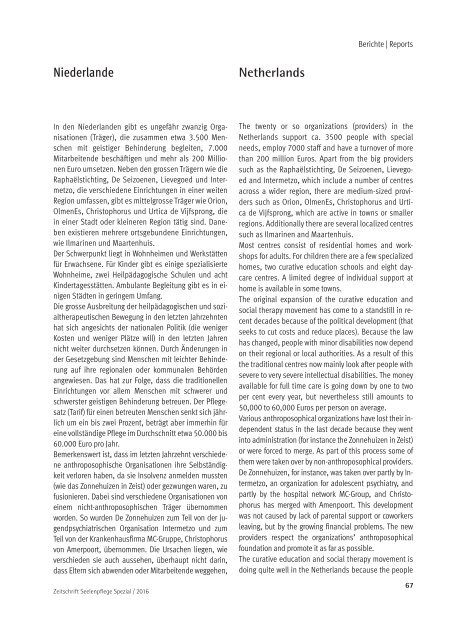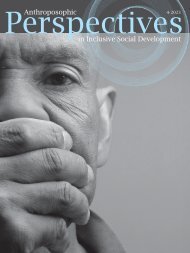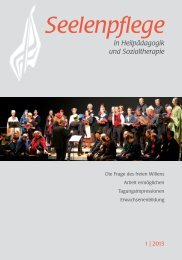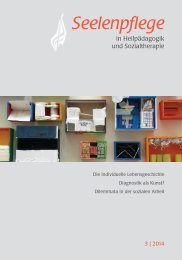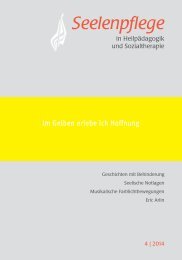Seelenpflege 2016-3-4 Spezial
Seelenpflege 2016-3-4 Spezial
Seelenpflege 2016-3-4 Spezial
You also want an ePaper? Increase the reach of your titles
YUMPU automatically turns print PDFs into web optimized ePapers that Google loves.
Berichte | Reports<br />
Niederlande<br />
Netherlands<br />
In den Niederlanden gibt es ungefähr zwanzig Organisationen<br />
(Träger), die zusammen etwa 3.500 Menschen<br />
mit geistiger Behinderung begleiten, 7.000<br />
Mitarbeitende beschäftigen und mehr als 200 Millionen<br />
Euro umsetzen. Neben den grossen Trägern wie die<br />
Raphaëlstichting, De Seizoenen, Lievegoed und Intermetzo,<br />
die verschiedene Einrichtungen in einer weiten<br />
Region umfassen, gibt es mittelgrosse Träger wie Orion,<br />
OlmenEs, Christophorus und Urtica de Vijfsprong, die<br />
in einer Stadt oder kleineren Region tätig sind. Daneben<br />
existieren mehrere ortsgebundene Einrichtungen,<br />
wie Ilmarinen und Maartenhuis.<br />
Der Schwerpunkt liegt in Wohnheimen und Werkstätten<br />
für Erwachsene. Für Kinder gibt es einige spezialisierte<br />
Wohnheime, zwei Heilpädagogische Schulen und acht<br />
Kindertagesstätten. Ambulante Begleitung gibt es in einigen<br />
Städten in geringem Umfang.<br />
Die grosse Ausbreitung der heilpädagogischen und sozialtherapeutischen<br />
Bewegung in den letzten Jahrzehnten<br />
hat sich angesichts der nationalen Politik (die weniger<br />
Kosten und weniger Plätze will) in den letzten Jahren<br />
nicht weiter durchsetzen können. Durch Änderungen in<br />
der Gesetzgebung sind Menschen mit leichter Behinderung<br />
auf ihre regionalen oder kommunalen Behörden<br />
angewiesen. Das hat zur Folge, dass die traditionellen<br />
Einrichtungen vor allem Menschen mit schwerer und<br />
schwerster geistigen Behinderung betreuen. Der Pflegesatz<br />
(Tarif) für einen betreuten Menschen senkt sich jährlich<br />
um ein bis zwei Prozent, beträgt aber immerhin für<br />
eine vollständige Pflege im Durchschnitt etwa 50.000 bis<br />
60.000 Euro pro Jahr.<br />
Bemerkenswert ist, dass im letzten Jahrzehnt verschiedene<br />
anthroposophische Organisationen ihre Selbständigkeit<br />
verloren haben, da sie Insolvenz anmelden mussten<br />
(wie das Zonnehuizen in Zeist) oder gezwungen waren, zu<br />
fusionieren. Dabei sind verschiedene Organisationen von<br />
einem nicht-anthroposophischen Träger übernommen<br />
worden. So wurden De Zonnehuizen zum Teil von der jugendpsychiatrischen<br />
Organisation Intermetzo und zum<br />
Teil von der Krankenhausfirma MC-Gruppe, Christophorus<br />
von Amerpoort, übernommen. Die Ursachen liegen, wie<br />
verschieden sie auch aussehen, überhaupt nicht darin,<br />
dass Eltern sich abwenden oder Mitarbeitende weggehen,<br />
Zeitschrift <strong>Seelenpflege</strong> <strong>Spezial</strong> / <strong>2016</strong><br />
The twenty or so organizations (providers) in the<br />
Netherlands support ca. 3500 people with special<br />
needs, employ 7000 staff and have a turnover of more<br />
than 200 million Euros. Apart from the big providers<br />
such as the Raphaëlstichting, De Seizoenen, Lievegoed<br />
and Intermetzo, which include a number of centres<br />
across a wider region, there are medium-sized providers<br />
such as Orion, OlmenEs, Christophorus and Urtica<br />
de Vijfsprong, which are active in towns or smaller<br />
regions. Additionally there are several localized centres<br />
such as Ilmarinen and Maartenhuis.<br />
Most centres consist of residential homes and workshops<br />
for adults. For children there are a few specialized<br />
homes, two curative education schools and eight daycare<br />
centres. A limited degree of individual support at<br />
home is available in some towns.<br />
The original expansion of the curative education and<br />
social therapy movement has come to a standstill in recent<br />
decades because of the political development (that<br />
seeks to cut costs and reduce places). Because the law<br />
has changed, people with minor disabilities now depend<br />
on their regional or local authorities. As a result of this<br />
the traditional centres now mainly look after people with<br />
severe to very severe intellectual disabilities. The money<br />
available for full time care is going down by one to two<br />
per cent every year, but nevertheless still amounts to<br />
50,000 to 60,000 Euros per person on average.<br />
Various anthroposophical organizations have lost their independent<br />
status in the last decade because they went<br />
into administration (for instance the Zonnehuizen in Zeist)<br />
or were forced to merge. As part of this process some of<br />
them were taken over by non-anthroposophical providers.<br />
De Zonnehuizen, for instance, was taken over partly by Intermetzo,<br />
an organization for adolescent psychiatry, and<br />
partly by the hospital network MC-Group, and Christophorus<br />
has merged with Amenpoort. This development<br />
was not caused by lack of parental support or coworkers<br />
leaving, but by the growing financial problems. The new<br />
providers respect the organizations’ anthroposophical<br />
foundation and promote it as far as possible.<br />
The curative education and social therapy movement is<br />
doing quite well in the Netherlands because the people<br />
67


